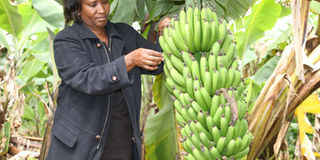Civil servant harvests wealth from bananas

Emily Sawe checks on bananas in her farm in Sotik. She harvests at least 10 banana bunches per week and ripens them before taking to the market. PHOTO | VITALIS KIMUTAI | NMG
What you need to know:
- The civil servant and mother of two says when she was transferred from Nairobi to Bomet six years ago, she made a decision to plant food crops on domestic and commercial scale.
- To make maximum returns, Mrs Sawe has devised a that does not involve brokers.
- She sells a ripe fruit for Sh10. A bunch has an average of 120 to 150 fruits.
- According to Mr Eric Boinnet, a horticulture officer in Bomet County, farmers should adhere to a spacing of three metres from plant to plant and four metres from row to the next when planting the bananas.
A maize plantation and tea bushes sit on the opposite sides of the homestead Mrs Emily Sawe practices mixed farming.
Sandwiched between the tea and maize is an acre with rows of dark green tissue culture bananas in different stages of growth.
As we enter the plantation, two workers are harvesting mature bunches of bananas weighing between 140 and 160 kilogrammes.
The civil servant and mother of two says when she was transferred from Nairobi to Bomet six years ago, she made a decision to plant food crops on domestic and commercial scale.
“I used to buy all food while in Nairobi. I decided that the only thing I would buy in the village would be what I could not grow,” Mrs Sawe said at her farm in at Koita village in Sotik.
Agricultural officers advised her to plant tissue culture banana.
“They showed me how to mix the soil with manure and plant the seedlings. I planted 250 seedlings which took 18 months to mature,” she said.
To make maximum returns, Mrs Sawe has devised a that does not involve brokers.
“I harvest at least 10 bunches a week and ripen it before taking them to the market. It takes five days. I used to sell green bananas after harvest, but I realised I was making losses,” she says.
She built a ripening chamber in her store. Mrs Sawe sells the bananas to schools, hospitals and fruit vendors.
“When I was selling the bananas to brokers, a bunch could fetch an average of Sh350 to Sh500. A ripe one goes for between Sh1,200 and Sh1,500,” she said.
She sells a ripe fruit for Sh10. A bunch has an average of 120 to 150 fruits.
FAST GROWTH AND RESISTANCE TO DISEASES
Mrs Sawe hopes to triple the earnings in a year due to the increased number of suckers which have grown from parent trees.
“Two people carry a bunch. At least two people are required to harvest it, with one holding the bottom part as the other cuts the stem and supports it,” Mrs Sawe said.
If it is not supported, the bunch could hit the ground and be crushed.
“After harvesting the fruits, I slice the leaves and trunk. I feed them to my cows. The banana stems and leaves come in handy, especially during dry season. The main stalk is not fed to the animal immediately. It is left to dry for hours,” she said.
According to Mr Eric Boinnet, a horticulture officer in Bomet County, farmers should adhere to a spacing of three metres from plant to plant and four metres from row to the next when planting the bananas.
“One acre of land should accommodate 330 tissue culture banana seedlings. Tissue culture banana seedlings are recommended because of its fast growth and resistance to diseases,” Mr Boinnet said.
Mr Boinnet said, “Farmers should dig a stool three feet deep and wide, mix the top soil with ripen farm yard or compost manure and 150 grams of DAP fertilizer before planting a banana seedling,”
“Each stool should hold not more than four suckers and they should be of varied sizes so as to ensure continuous harvest all year round. The farm should be weed free so as to curb disease and pest attack while manure should frequently be spread,” Mr Boinnet stated.
****
Get it fast
County partners with Jkuat in the project
- The county government of Bomet has supplied 100,000 tissue culture banana seedlings from Jomo Kenyatta University of Agriculture and Technology in just two months.
- Farmers purchase the banana seedlings at a subsidised cost of Sh50 as compared to Sh150 in the market.
- According to Governor Joyce Laboso’s administration, subsidising the banana seedlings will reduce hunger and enable farmers get an extra income. An acre should have 330 tissue banana seedlings.





